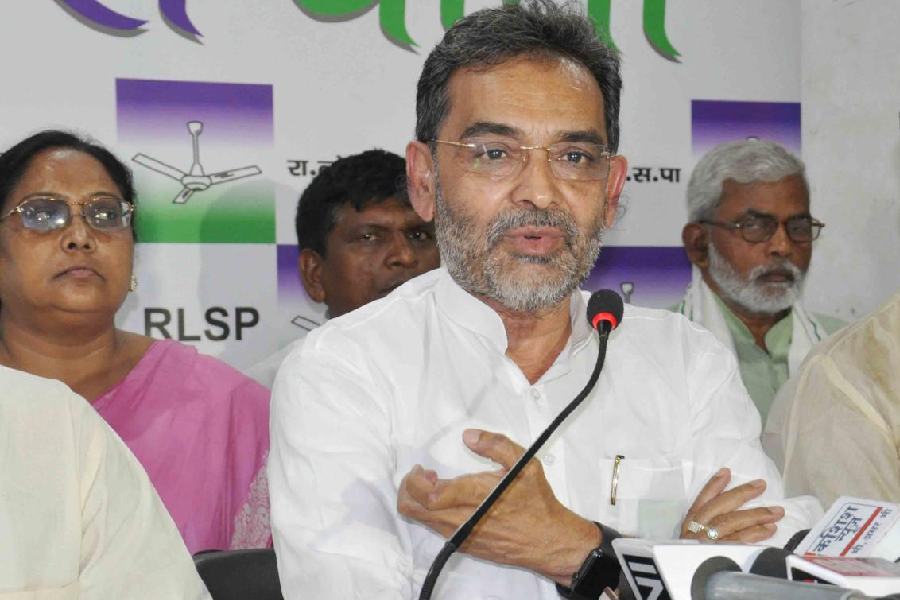Rajya Sabha member Upendra Kushwaha on Tuesday attacked the collegium system for appointing judges and alleged that it prevented those from backward groups from being appointed to the higher judiciary.
The Rashtriya Lok Morcha leader, who recently took oath as a Rajya Sabha member from Bihar, said at a press conference that the "lack of democracy in the judiciary" would be among the issues he would raise in Parliament.
He also said that there was no problem with the sub-categorisation of Scheduled Castes (SCs), but added that there should be no concept of a "creamy layer" even within Other Backward Classes (OBCs).
"There is no democracy in judiciary and that is unfortunate. We are a democracy but it's an irony that one of the biggest institutions, the judiciary, does not have a democratic system for appointing judges," Kushwaha said.
"Usually people who are well connected get appointed as judges. Those from the Dalit and backward sectors rarely become a judge," he claimed.
He also referred to the National Judicial Appointments Commission (NJAC) Act that was struck down by the Supreme Court.
"We will raise this issue in Parliament, as well as outside. We will make people aware of the issue," he said.
The Narendra Modi government enacted the NJAC Act in 2014.
The NJAC was tasked with the responsibility of making judicial appointments and included the Chief Justice of India, two senior Supreme Court judges, the Union law minister and two other eminent persons nominated by the Chief Justice, the prime minister and the Lok Sabha opposition leader.
However, in October 2015, the Supreme Court struck down the law as "unconstitutional".
Asked about the recent controversy around the apex court's observations on the sub-categorisation of SCs, he said, "There should be sub-categories... but the concept of creamy layer should not be there. Even among OBCs, the concept of creamy layer is not right." A seven-judge Constitution bench headed by Chief Justice DY Chandrachud held by a 6:1 majority that further sub-classification of SCs and Scheduled Tribes (STs) by states could be permitted to ensure quotas for castes that were more backward among them.
Four of the six judges who agreed that states were empowered to make sub-classifications wrote in their separate judgments that those in the creamy layer must be excluded from enjoying the benefits of reservation.
Kushwaha also threw his weight behind a "caste census", pointing out that the BJP had supported the survey exercise in Bihar.
Asked if he would raise the issue on a "caste census" with the Centre, he said, "I will raise it, if required." Kushwaha, who contested the Lok Sabha elections from the Karakat seat as a National Democratic Alliance (NDA) candidate and lost to CPI(ML) Liberation's Raja Ram Singh, said contesting on fewer seats was a disadvantage for his party.
The "mistake" will be corrected in the Bihar assembly elections, he added.
"We faced some setbacks due to the Lok Sabha election formula but, based on our experience, we will make corrections in the assembly election," he said, refusing to elaborate.
"Let bygones be bygone," he said.
Responding to a question on Leader of Opposition in the Lok Sabha Rahul Gandhi's remarks in the US, including that on unemployment in India, he said, "We should all be one on international platforms. Ruling and opposition sides are there in the country but, outside India, we are one." As a Rajya Sabha member, Kushwaha said he would raise the issue of the special attention that Bihar needed for development.
"India will be developed when states like Bihar are developed," he said.
While thanking the Union government for allocations made to Bihar in this year's Union budget, Kushwaha said the state needed more attention and mentioned education, health and continuing migration from the state among the major issues.
Except for the headline, this story has not been edited by The Telegraph Online staff and has been published from a syndicated feed.












